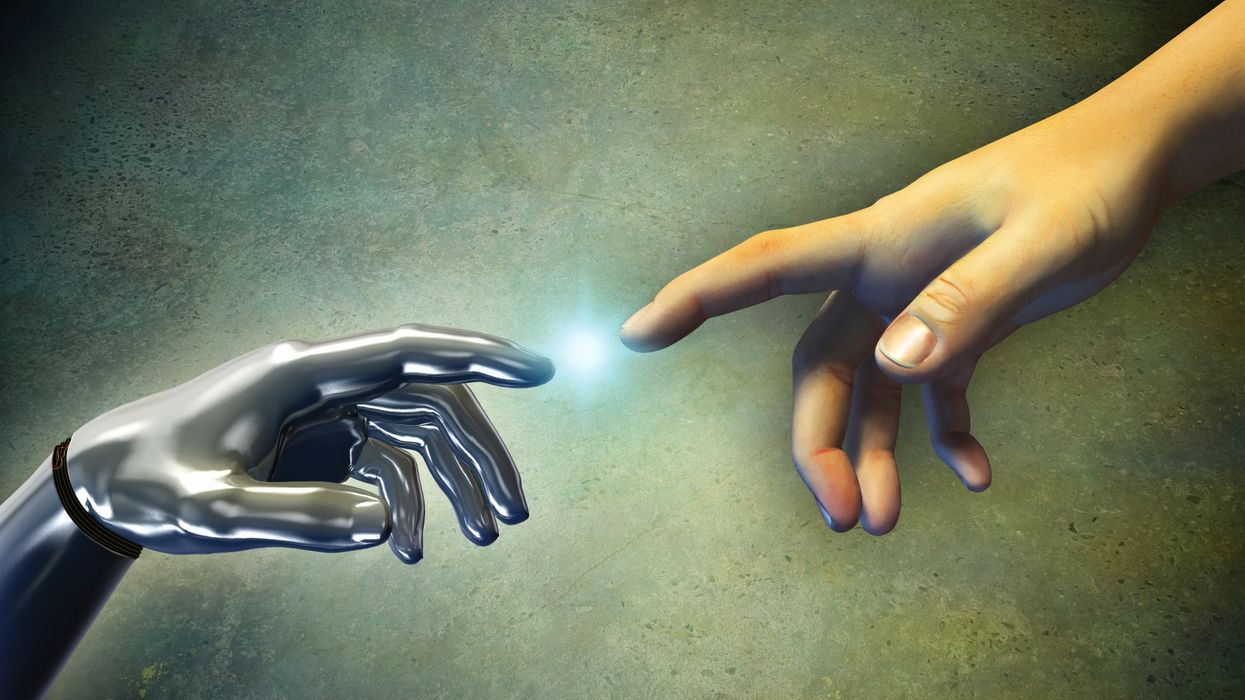
Andreus/Getty

Last week, I noted that top technologists were increasingly anti-Sam Altman, the wannabe trillionaire behind OpenAI and Worldcoin who acts like he’s auditioning to be the Antichrist.
Today’s proof: After much grumbling, Elon Musk is suing Altman and OpenAI, the company he once helped start to – you guessed it – foster the open development of artificial intelligence. Instead, Altman outfoxed Elon, turning the firm into a lever with which he hoped, behind the scenes at the loftiest levels of technological geopolitics, to move the world.
But the bad news is that too many Americans, and way too many technologists, still think that we can have our cake and eat it too, spiritually speaking, making a god of “truth” instead of humbling and quieting our passions and fears to the point where we are prepared to hear and receive the truth of God.
The lawsuit is, therefore, a landmark in the ever-higher-stakes battle to – as Google disarmingly describes the arms race – “organize the world’s information.” Last summer, I warned on X, “The West is barreling toward a Master Feed model, not just in apps but all life, where he who controls rank, value, weight, and placement” in that feed “governs” the digitized country.
In short, this feed eats you, wherever, whenever you are – a power so total that even well-meaning technologists at the top of the food chain feel compelled to a battle royale over its possession and use.
To make sense of the magnitude of this struggle, many Americans of a certain age are apt to reach for a "Lord of the Rings" metaphor. But that quasi-Christian mythology fails to capture the polytheistic dynamic defining today’s technological "Clash of the Titans." Here we have a struggle among the robot avatars of rival pagan gods.
For years, wild-eyed nerds have insisted that AI technicians are actually building a god. They’re wrong, but it’s not hard to understand why – the only source of human authority over a machine as powerful as the automated general simulators we call “artificial intelligence” is religious authority, imparted by the divine. Merely human-generated laws are now insufficient to speak authoritatively about the limits and purposes of apex technology.
The good news for America is that the most important laws we can pass concerning digital tech are the kinds of laws that best accord with our Constitution – laws that protect our implicit rights to keep and bear computational devices and to use them to freely associate with one another, instead of picking winners and losers or drawing arbitrary lines and limits.
But the bad news is that too many Americans, and way too many technologists, still think that we can have our cake and eat it too, spiritually speaking, making a god of “truth” instead of humbling and quieting our passions and fears to the point where we are prepared to hear and receive the truth of God.
No matter how well-meaning, this flawed intention is displayed dramatically in the war over OpenAI. Musk’s great alternative to Altman’s automated supervillain routine is Grok, his own AI ostensibly dedicated to – worshiping at the altar of – truth. “In the coming weeks,” Elon recently announced, “Grok will summarize these mammoth laws before they are passed by Congress, so you know what their real purpose is.”
Who could debate against that! But what’s at stake plays out on a spiritual level higher than that of debate – at the level of our ultimate identity, meaning, and purpose. “Every argument has a counter-argument,” wrote St. Gregory Palamas amidst the titanic philosophical debates of his day. “But who can argue against life?”
It may feel like salvation from political slavery to possess an AI that can tell us what our ostensible representatives won’t (or can’t) about the laws they manufacture without our knowledge or understanding. But the moment we accept an AI as our source of truth, we give in to the spiritual temptation to start arguing ourselves into believing that AI is, and should be, the source of truth that we must trust! This AI will become the Master Feed that everyone from Musk to Altman to Google to Sam Bankman-Fried has decided is the ultimate prize in this world.
An AI that doesn’t hate us? One programmed not to lyingly catechize us with woke doctrines? One we don’t have to be afraid to ask a simple question? It’s easy to get behind all that.
But the discernment required to survive the spiritual warfare of our digital age isn’t about what’s easy. It’s about finding the strength in God required to do what’s hardest of all – watchfully guard our deep and mysterious hearts against the subtle infiltration of bogus substitutes for God’s love. There’s no more insidiously convincing would-be substitute today than an AI that promises to treat you just the way you deserve.
Giving in to the temptation to make the biggest decisions about the most important things based on what we think we deserve is a colossal, even deadly, spiritual defeat – a lazy, prideful, gluttonous act of will that reduces us to utter servility in our inner and outer life.
They say the road to hell is paved with good intentions. What better intention could there be than an AI that can save us from all the bad AIs – from all falsehood and error? Only one Savior can do that, and He expects from us a strenuous fight to the end – not the entry of a prompt or the push of a button.
- YouTube youtu.be
James Poulos
BlazeTV Host